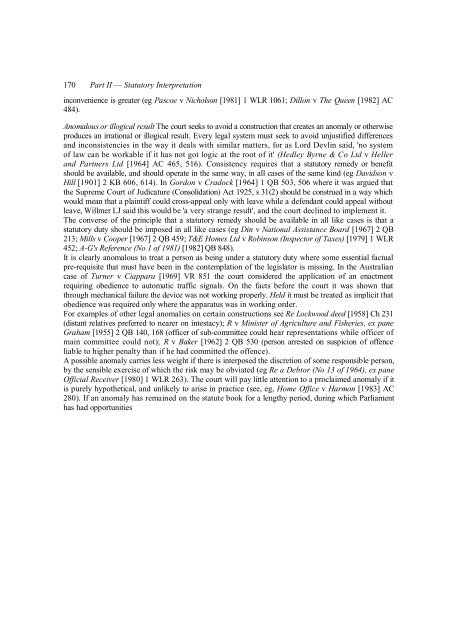Statutory Interpretation The Technique of Statutory ... - Francis Bennion
Statutory Interpretation The Technique of Statutory ... - Francis Bennion
Statutory Interpretation The Technique of Statutory ... - Francis Bennion
You also want an ePaper? Increase the reach of your titles
YUMPU automatically turns print PDFs into web optimized ePapers that Google loves.
170 Part II — <strong>Statutory</strong> <strong>Interpretation</strong><br />
inconvenience is greater (eg Pascoe v Nicholson [1981] 1 WLR 1061; Dillon v <strong>The</strong> Queen [1982] AC<br />
484).<br />
Anomalous or illogical result <strong>The</strong> court seeks to avoid a construction that creates an anomaly or otherwise<br />
produces an irrational or illogical result. Every legal system must seek to avoid unjustified differences<br />
and inconsistencies in the way it deals with similar matters, for as Lord Devlin said, 'no system<br />
<strong>of</strong> law can be workable if it has not got logic at the root <strong>of</strong> it' (Hedley Byrne & Co Ltd v Heller<br />
and Partners Ltd [1964] AC 465, 516). Consistency requires that a statutory remedy or benefit<br />
should be available, and should operate in the same way, in all cases <strong>of</strong> the same kind (eg Davidson v<br />
Hill [1901] 2 KB 606, 614). In Gordon v Cradock [1964] 1 QB 503, 506 where it was argued that<br />
the Supreme Court <strong>of</strong> Judicature (Consolidation) Act 1925, s 31(2) should be construed in a way which<br />
would mean that a plaintiff could cross-appeal only with leave while a defendant could appeal without<br />
leave, Willmer LJ said this would be 'a very strange result', and the court declined to implement it.<br />
<strong>The</strong> converse <strong>of</strong> the principle that a statutory remedy should be available in all like cases is that a<br />
statutory duty should be imposed in all like cases (eg Din v National Assistance Board [1967] 2 QB<br />
213; Mills v Cooper [1967] 2 QB 459; T&E Homes Ltd v Robinson (Inspector <strong>of</strong> Taxes) [1979] 1 WLR<br />
452; A-G's Reference (No 1 <strong>of</strong> 1981) [1982] QB 848).<br />
It is clearly anomalous to treat a person as being under a statutory duty where some essential factual<br />
pre-requisite that must have been in the contemplation <strong>of</strong> the legislator is missing. In the Australian<br />
case <strong>of</strong> Turner v Ciappara [1969] VR 851 the court considered the application <strong>of</strong> an enactment<br />
requiring obedience to automatic traffic signals. On the facts before the court it was shown that<br />
through mechanical failure the device was not working properly. Held it must be treated as implicit that<br />
obedience was required only where the apparatus was in working order.<br />
For examples <strong>of</strong> other legal anomalies on certain constructions see Re Lockwood deed [1958] Ch 231<br />
(distant relatives preferred to nearer on intestacy); R v Minister <strong>of</strong> Agriculture and Fisheries, ex pane<br />
Graham [1955] 2 QB 140, 168 (<strong>of</strong>ficer <strong>of</strong> sub-committee could hear representations while <strong>of</strong>ficer <strong>of</strong><br />
main committee could not); R v Baker [1962] 2 QB 530 (person arrested on suspicion <strong>of</strong> <strong>of</strong>fence<br />
liable to higher penalty than if he had committed the <strong>of</strong>fence).<br />
A possible anomaly carries less weight if there is interposed the discretion <strong>of</strong> some responsible person,<br />
by the sensible exercise <strong>of</strong> which the risk may be obviated (eg Re a Debtor (No 13 <strong>of</strong> 1964), ex pane<br />
Official Receiver [1980] 1 WLR 263). <strong>The</strong> court will pay little attention to a proclaimed anomaly if it<br />
is purely hypothetical, and unlikely to arise in practice (see, eg, Home Office v Harmon [1983] AC<br />
280). If an anomaly has remained on the statute book for a lengthy period, during which Parliament<br />
has had opportunities

















